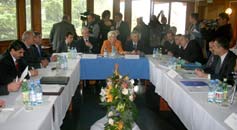|
Wednesday,
October 24,
2007, #203 (1470)
 All four sides sit down for Tbilisi talks on South Ossetia conflict All four sides sit down for Tbilisi talks on South Ossetia conflict
By Eter Tsotniashvili

Low expectations for the year’s first full JCC
session (Photo by OSCE/David Khizanishvili)
|
The first full Joint Control Commission session in more than year opened October 23 in the OSCE’s Tbilisi office.
The two-day session of the quadripartite dialogue format, meant to bring together sides involved in the South Ossetian conflict, follows a number of cancellations for sessions scheduled both in Tbilisi and the de facto secessionist capital of Tskhinvali.
The Georgian side, once represented by State Minister for Conflict Resolution Davit Bakradze, is led by deputy state minister Dimitri Manjavidze. The South Ossetian and Russian co-chairs are Boris Chochiev and Yuri Popov, respectively, with the North Ossetian side is represented by Teimuraz Mamsurov.
Bakradze attended only the opening session, leaving his deputy state minister to act as co-chair.
Georgia’s representation on the Joint Control Commission (JCC) was downgraded to the deputy state minister in August, as part of Tbilisi’s continuing protest against what it sees as the Russian-dominated talks format.
Bakradze did speak to journalists before the session, reiterating the government’s key demands of demilitarization of the South Ossetian region and the broadening of control over the Roki Tunnel checkpoint on the border with Russia and the breakaway territory.
“We consider the main danger to come from the armed formations in that region. Our main priority is to disarm these people and extract a promise to forbid illegal arms entering [South Ossetia]. I‘m talking about controlling the Roki Tunnel and the territory of Didi Gupta,” Bakradze said before the session began in OSCE’s Tbilisi office.
“Holding this JCC session, especially in Tbilisi, is a positive step,” he added.
At the same time, Bakradze emphasized Georgia’s skepticism on the JCC’s efficacy. The commission has made demilitarization resolutions, he said, which have still not been fulfilled.
The South Ossetian co-chair, Boris Chochiev, said he would bring up South Ossetia residents arrested by Georgian peacekeepers in the conflict zone.
Chochiev also called for a meeting and non-violence pact between Georgian President Mikheil Saakashvili and de facto South Ossetian leader Eduard Kokoity.
“The resolution of the Georgian-South Ossetian conflict must be discussed at the highest level, a discussion which would be concluded with a memorandum excluding the renewal of military confrontation,” Chochiev said.
Georgia, meanwhile, says they won’t sign a non-violence agreement until the alleged illegal flow of arms through the Roki Tunnel is cut off. A non-violence agreement would forbid them from responding to aggression and confiscating the heavy arms regularly found in the conflict zone, Tbilisi claims.
Georgian peacekeeper commander Mamuka Kurashvili was also in attendance. He said the Georgian side would do its best to find consensus and common ground to win peace in the region.
New OSCE head in Georgia Terhi Hakala, speaking to media, was positive but realistic about what could come out of the session.
“I hope that it will be a good dialogue, however we cannot assess this meeting until tomorrow when it is finished,” Hakala said.
There have been numerous sessions canceled since the last full meeting in 2006, when former state minister for conflict resolution and current opposition figure Goga Khaindrava was in office.
A Tbilisi session planned for August 9 fell through when South Ossetian representatives refused to come to the Georgian capital, citing security concerns.


© The Messenger. All
rights reserved. Please read our disclaimer
before using any of the published materials.
|